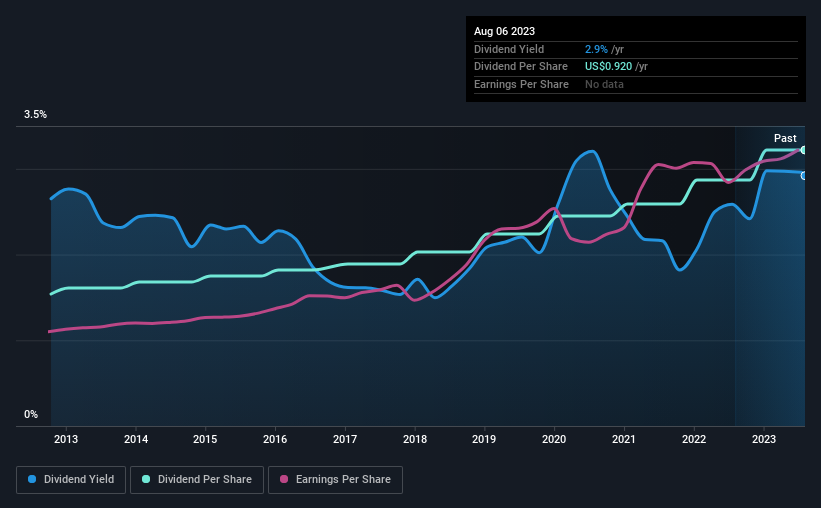Why You Might Be Interested In Enterprise Bancorp, Inc. (NASDAQ:EBTC) For Its Upcoming Dividend
Enterprise Bancorp, Inc. (NASDAQ:EBTC) stock is about to trade ex-dividend in 3 days. The ex-dividend date occurs one day before the record date which is the day on which shareholders need to be on the company's books in order to receive a dividend. The ex-dividend date is important because any transaction on a stock needs to have been settled before the record date in order to be eligible for a dividend. Meaning, you will need to purchase Enterprise Bancorp's shares before the 10th of August to receive the dividend, which will be paid on the 1st of September.
The company's next dividend payment will be US$0.23 per share, on the back of last year when the company paid a total of US$0.92 to shareholders. Last year's total dividend payments show that Enterprise Bancorp has a trailing yield of 2.9% on the current share price of $31.5. Dividends are a major contributor to investment returns for long term holders, but only if the dividend continues to be paid. We need to see whether the dividend is covered by earnings and if it's growing.
See our latest analysis for Enterprise Bancorp
If a company pays out more in dividends than it earned, then the dividend might become unsustainable - hardly an ideal situation. Enterprise Bancorp paid out just 24% of its profit last year, which we think is conservatively low and leaves plenty of margin for unexpected circumstances.
When a company paid out less in dividends than it earned in profit, this generally suggests its dividend is affordable. The lower the % of its profit that it pays out, the greater the margin of safety for the dividend if the business enters a downturn.
Click here to see how much of its profit Enterprise Bancorp paid out over the last 12 months.
Have Earnings And Dividends Been Growing?
Stocks in companies that generate sustainable earnings growth often make the best dividend prospects, as it is easier to lift the dividend when earnings are rising. If earnings fall far enough, the company could be forced to cut its dividend. For this reason, we're glad to see Enterprise Bancorp's earnings per share have risen 17% per annum over the last five years.
The main way most investors will assess a company's dividend prospects is by checking the historical rate of dividend growth. Since the start of our data, 10 years ago, Enterprise Bancorp has lifted its dividend by approximately 7.7% a year on average. It's encouraging to see the company lifting dividends while earnings are growing, suggesting at least some corporate interest in rewarding shareholders.
Final Takeaway
Has Enterprise Bancorp got what it takes to maintain its dividend payments? Companies like Enterprise Bancorp that are growing rapidly and paying out a low fraction of earnings, are usually reinvesting heavily in their business. This strategy can add significant value to shareholders over the long term - as long as it's done without issuing too many new shares. Overall, Enterprise Bancorp looks like a promising dividend stock in this analysis, and we think it would be worth investigating further.
Curious about whether Enterprise Bancorp has been able to consistently generate growth? Here's a chart of its historical revenue and earnings growth.
Generally, we wouldn't recommend just buying the first dividend stock you see. Here's a curated list of interesting stocks that are strong dividend payers.
Have feedback on this article? Concerned about the content? Get in touch with us directly. Alternatively, email editorial-team (at) simplywallst.com.
This article by Simply Wall St is general in nature. We provide commentary based on historical data and analyst forecasts only using an unbiased methodology and our articles are not intended to be financial advice. It does not constitute a recommendation to buy or sell any stock, and does not take account of your objectives, or your financial situation. We aim to bring you long-term focused analysis driven by fundamental data. Note that our analysis may not factor in the latest price-sensitive company announcements or qualitative material. Simply Wall St has no position in any stocks mentioned.

